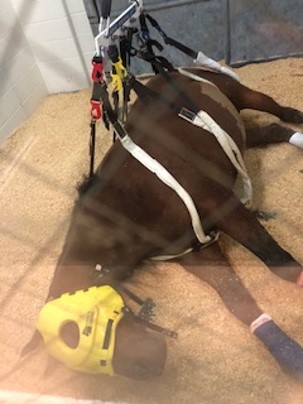No one likes mosquitoes. From the itchy bumps that ruin barbecues and bonfires to the more serious health threats like the Zika virus and Malaria, mosquitoes are one insect that will surely put a damper on your day.
But did you know these airborne pests also pose a significant threat to horses? Among the diseases horses can contract from mosquito exposure, West Nile Virus (WNV) is one that every horse owner needs to know about. WNV can have numerous cognitive effects on a horse, with some, such as gait and behavioral abnormalities, lasting even beyond treatment, making it imperative for horse owners to be able to recognize it quickly and arrange proper equine health services.
To help you better understand WNV in horses and how to prevent it, let's dive into some frequently asked questions.
.jpg)
What is West Nile Virus in Horses?
To start, let's cover exactly what WNV is and take a look at its prevalence in the United States over the past two decades. Essentially, WNV is a virus transmitted by mosquitoes, and, therefore, cases typically occur when mosquito activity is high. Numerous species of mosquitoes have been shown to carry WNV, and the types of carriers can vary depending on geographic region.
Over 27,000 horses have received an official WNV diagnosis since the virus was first detected in North America in 1999, and, of those infected and diagnosed, there was an approximate average case fatality rate ranging between 30% and 40%, according to 2017 research from the American Association of Equine Practitioners (AAEP). Due to the regular yearly occurrence of reported cases, WNV is currently acknowledged as endemic in the United States.
A 2018 report from the USDA Animal and Plant Health Inspection Service (APHIS) Veterinary Services (VS) branch revealed that in that calendar year, 493 WNV equine cases occurred in 42 states, with Montana (50), Ohio (50), and Pennsylvania (112) reporting the highest number of cases.
However, despite the prominence of discussion of WNV cases in the United States, WNV cases in horses have also been reported in Canada, Mexico, and the Caribbean.
How Can I Tell If My Horse Is Infected with West Nile Virus?
A horse infected with WNV can show a variety of symptoms, which could include:
- Low-grade fever
- Colic
- Lameness
- Decreased appetite
- Dull demeanor
Horses more severely affected may show signs of:
- Ataxia (wobbly gait)
- Weakness
- Trouble standing
- Muscle twitching
- Abnormal behavior
- Facial paralysis
- Other neurologic signs
The disease can be life-threatening in horses, and humane euthanasia is often recommended for horses who are most severely affected. If you suspect that your horse is exhibiting any of these symptoms, call your veterinarian immediately; prompt treatment from an experienced professional can be life-saving and potentially save your horse from lingering symptoms after the infection!
Can My Horse Transmit WNV to Other Horses or Humans?
Thankfully, horses can NOT transmit the virus to other horses or humans. So, the isolation of these horses is not necessary.
It is, however, important to recognize that if one horse on the property is affected, then the other horses are also at high risk, considering they are in the same mosquito environment. If one horse has been diagnosed with WNV, it's a good time to have your other horses examined to rule out the possibility of multiple infections. Staying on top of your horse's routine wellness exams can be a huge help in identifying if anything from your horse's typical baseline is off or recognizing new symptoms of WNV.
.jpg)
How Can I Protect My Horse from WNV?
Vaccination is the absolute best way to prevent disease, and WNV in horses is no exception. We recommend horses be vaccinated for WNV every year before the start of mosquito season. Horses that are in endemic areas with extended mosquito seasons (i.e., Texas, Florida) may benefit from revaccination every six months. Ideally, vaccination is done by a veterinarian using an FDA-approved product, as not every vaccine is created equal.
Beyond vaccination, horse owners can implement mosquito control via fly sprays, fly sheets, and reducing standing water in pastures and turnouts. While these methods are not as effective as vaccination, they can help control mosquito populations and decrease the likelihood of WNV transmission to your horses.
You can also contact local community mosquito management agencies in your area if you're concerned about mosquito populations or have questions about mosquito management.
How Can My Horse Be Tested for WNV?
Horses showing symptoms of WNV can be tested for the disease from a blood sample. In certain scenarios, it may also be recommended to submit cerebrospinal fluid (CSF) for testing. Collection of CSF can be relatively difficult and may not be appropriate for all horses. We do not recommend testing horses who are not showing clinical signs.

WNV is a reportable disease, which means that any horse that is tested has to be reported to the USDA government officials. This reporting does not get you in trouble but allows for disease documentation – like the reports we shared above – to help reduce the spread of disease and increase awareness of its occurrence.
Is WNV Treatable?
There is no specific treatment for WNV, but supportive care can be provided in the form of anti-inflammatories, antioxidants, and fluid therapy or by placing a horse in a sling if they are unable to stand or at risk of becoming recumbent. Not all facilities have the ability to sling a horse, as it requires specific equipment and stalling, so be sure to communicate with your vet in order to ensure they can facilitate proper care for your horse.
If you have questions and you'd like to reach out to us, you can call us directly at (970) 987-4757, or you can email us at [email protected]. Don't forget to follow us on social media Facebook, Instagram.
